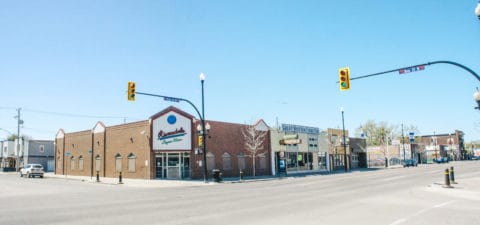Developments in Saskatoon’s Riversdale and surrounding areas near 20th Street West have been accelerating at a fast pace throughout recent years. The economic, social and cultural implications of these changes reap a variety of benefits and consequences for students and community members living in Saskatoon.
The Riversdale area, located within the inner city, has recently undergone several infrastructural changes. New construction projects, businesses and housing units have been introduced in the area to promote a revitalization of the neighbourhood.

The once iconic 20th Street West and Riversdale area has experienced a surge of development in recent years.
These developments have received positive reviews from many students living in Saskatoon, for the fresh and modernized atmosphere created by the reconstruction of the neighbourhood.
Fourth-year regional and urban planning student Simon Bossen notes that the developments in the Riversdale area will help boost both the economy and a sense of civic identity, which he believes is beneficial for Saskatoon as a whole.
“It creates a sense of place where somebody that has visited Saskatoon now has something unique to that city,” Bossen said. “If you have a healthy business district, it attracts companies to want to put their headquarters here because people are going to want to live here. That makes it easy to attract good talent for the company.”
In addition to these benefits, Bossen outlines how these changes are advantageous for students. Walking and bike paths have made transportation more accessible, overall safety has increased in this area and establishments such as local businesses, the Remai Modern Art Gallery and the Persephone Theatre provide students with the opportunity to be engaged in this larger process of city-wide growth.
Fourth-year English student Sarah Dorward has been a resident of Meadowgreen, a neighbouring area to Riversdale since she was six years old. In addition, Dorward is an employee of Little Bird Patisserie & Café and freelancer for Flow Magazine, both situated in Riversdale.
“Working in Riversdale is such a community; it’s so easy to get to know people,” Dorward said. “As somebody who’s still a student and freelancing with Flow, it’s really helpful getting to know the other people in the neighbourhood who have so many different skill sets and have so much information.”
Despite the positive changes observed by students, there may also be negative effects of these developments that directly impact residents living within these areas. Bossen notes that although the coffee shops, restaurants and boutiques in Riversdale may be appealing to the student demographic, they come at the expense of residents in the area who are at a lower economic standing.
“Gentrification is the process where the higher economic standing citizens or businesses move in and take over a neighbourhood that was traditionally lower-economic class and force out the people that have lived there,” Bossen said. “They’re putting businesses that are edging out the people that live there, and those people don’t really have anywhere else to go that fits their needs.”
Dorward also notes that although she has experienced increased access to services, others living in the area may not gain the same benefits.
“In some regards, the initial patrons of the Riversdale community could potentially be feeling effects of displacement. It’s become so developed and so populated that what used to be quite familiar, no longer is,” Dorward said.
Bossen argues that the businesses and services that existed prior to these developments were intended to serve the patrons of a lower socio-economic status. He states that this is the demographic that is now being displaced entirely or may not have the means to access the once existing establishments in the neighbourhood. Despite this displacement, he believes that solutions can be found.
“If these people get edged out elsewhere, there’s a good to fair chance that they might not have the means to commute to that centre that was put there to try to help them,” Bossen said. “If you can work towards development that doesn’t include gentrification by having mixed housing stock, then you can help solve some of these social issues and not just sweep them into a rug of a different neighbourhood.”
—
Jessica Quan
Photo: Jeremy Britz / Photo Editor